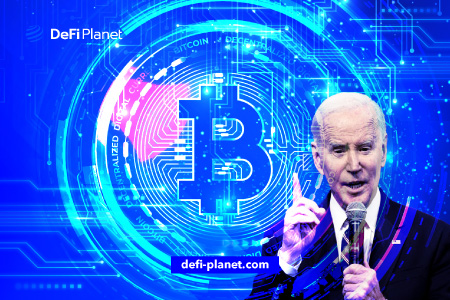Introduction
If you believed that the hostile demeanour of the United States’ regulatory stance towards the cryptocurrency sector lacked backing from the government, President Joe Biden has taken steps to shatter that illusion.
On 21 March 2023, the White House published its Economic Report of the President (Report), which dedicated an entire chapter to crypto. Here’s the TL;DR summary: crypto is bad and has no intrinsic or fundamental value, but governments may be able to salvage some value from it in future via things like Central Bank Digital Currencies (CBDCs). The Report says that a U.S. CBDC “would have the potential to offer significant benefits.”
The Report, which is decidedly anti-crypto, sets out a series of what it calls “claims” in a section titled “The Perceived Appeal of Crypto Assets” – these are the potential benefits of crypto that the White House says are “often touted by their proponents .”It then goes on to offer a rebuttal of these claims with what it called the “The Reality of Crypto Assets.”
Below is a critique of the Biden White House’s lacklustre attitude to crypto and its seeming endorsement of the SEC’s flawed regulation-by-enforcement strategy.
Claims vs Realities
The White House sets out the following five statements as “Claims” made by the proponents of crypto:
- Crypto Assets Could Be Investment Vehicles
- Cryptocurrencies Could Offer Money-like Functions without Relying on a Single Authority
- Crypto Assets Could Enable Fast Digital Payments
- Crypto Assets Could Increase Financial Inclusion
- Crypto Assets Could Improve the United States’ Current Financial Technology Infrastructure
Evidently not buying these claims, the White House then purports to refute these claims with its own set of seven “Realities”:
- Crypto Assets Are Mostly Speculative Investment Vehicles
- Cryptocurrencies Generally Do Not Perform All the Functions of Money as Effectively as Sovereign Money, such as the U.S. Dollar
- Stablecoins Can Be Subject to Run Risk
- Crypto Assets Can Be Harmful to Consumers and Investors
- There Have Been Limited Economic Benefits from DLT Technology
- The Risks of Financial Innovation
- Other Risks from Crypto Assets – leverage risks, price volatility, illicit finance risks, and ransomware uses
Warnings from history – for banking or for crypto?
Amid the continuing collapses of several traditional banks, including Silvergate Bank, Silicon Valley Bank, and Signature Bank, and the imminent possibility of a widespread banking catastrophe that has already necessitated government rescues – all following familiar and recurring patterns of fractional reserve banking leading to liquidity crunches – the Report seems to express a degree of conceit, and apparently without any sense of irony, that advocates of crypto “have been relearning the lessons from previous financial crises the hard way .”The chapter on crypto is even titled “Digital Assets: Relearning Economic Principles,” which underscores the message the U.S. Presidency is attempting to convey.
There is some real chastisement in the Report for proponents of decentralized digital assets, with historical lessons about the origins of money, as well as some reminders of “economic principles,” including by reference to the U.S. banking crisis of 1907 when a series of state-chartered banks suffered a run as customers rushed to withdraw their deposits.
Despite the current brewing banking crisis, and with a certain degree of narrow-mindedness, the Report presents the following statement without any apparent sense of irony:
“Innovation in financial services brings both risks and opportunities for the broader economy. It can challenge business models and existing industries, but it cannot challenge basic economic principles, such as what makes an asset effective as money and the incentives that give rise to run risk.”
Regulators and central banks often warn of the potential for unregulated crypto to spread risk to the regulated banking sector. However, the opposite has recently been observed, with contagion from the banking sector to crypto.
It is ironic that the “free market” economic theory’s inherent price of commercial failure has been evident in the crypto sector, where many firms have failed and tokens devalued or eradicated. The banking sector, on the other hand, is not subject to market forces, as bailouts and government rescues have become the norm.
Regulatory clarity on the horizon?
The United States has undoubtedly experienced regulatory turmoil regarding crypto. Crypto companies and startups are constantly on edge, fearing penalties for violating imaginary regulations. The Securities and Exchange Commission (U.S. SEC), which is responsible for regulating securities, has become proficient in “regulation-by-enforcement.” Despite the lack of a rulebook outlining the requirements that these companies allegedly violated, the U.S. SEC has launched numerous enforcement actions and imposed billions of dollars in fines on digital asset firms, e.g., Nexo and BlockFi.
Contrary to the normal operation of the rule of law, the U.S. SEC has unilaterally expanded the scope of its own authority and jurisdiction and has done so without setting out a rulebook for crypto. So far, it seems to identify its target firms and individuals randomly and then seeks to punish them for falling foul of the SEC’s (private, unpublished) interpretation of a 1946 U.S. Supreme Court case (SEC v. W.J. Howey Co.) about an investment contract involving a sale and leaseback of citrus groves. Many experts and commentators have already put forth arguments on why cryptos are not securities.
In any case, whether or not a crypto is a security is the wrong question. It is a self-serving question that has relevance only because securities are what the U.S. SEC has jurisdiction over. Cryptos are clearly not securities, but that doesn’t mean some crypto-related activities should not be regulated: they should be. But, first, you make the rules; next, you supervise; then, you enforce. The U.K. government’s recent proposals for crypto regulation are an example of how this can be done.
“First, you make the rules; next, you supervise; then, you enforce.”
A better approach is to create a new class of regulated activities based on crypto. It is patently unfair and counter-productive to enforce ad hoc against non-existent rules. Even one of its own commissioners, the fiercely independent-minded Hester Peirce, has often spoken against the U.S. SEC’s approach, arguing instead for rulemaking to provide regulatory clarity.
Despite the increasing regulatory chaos surrounding digital assets, the U.S. SEC and its current chairman, Gary Gensler, have persisted with their approach of regulation-by-enforcement instead of rulemaking. While many are looking to the U.S. government and Congress to step in and provide much-needed clarity, the White House seems unconcerned and unlikely to propose any useful legislation. The Biden administration appears satisfied with the current state of affairs, believing that the U.S. SEC and other agencies are doing an adequate job.
The Economic Report of the President confidently asserts that:
“Much of the activity in the crypto asset space is covered by existing regulations and regulators are expanding their capabilities to bring a large number of new entities under compliance. Other parts of the crypto asset space require coordination by various agencies and deliberations about how to address the risks they pose.”
Thus, it appears that the White House is endorsing the U.S. SEC in its regulatory power grab and enforcement-centric approach to policymaking. Therefore, we should anticipate further upheaval in this space.
Of fundamental and intrinsic value
The Report states on several occasions that crypto has no intrinsic or fundamental value and went as far as to say that even commodities such as gold and silver have fundamental values given their usage in jewellery and manufacturing.
The Report concludes on crypto:
“Indeed, crypto assets to date do not appear to offer investments with any fundamental value, nor do they act as an effective alternative to fiat money, improve financial inclusion, or make payments more efficient; instead, their innovation has been mostly about creating artificial scarcity in order to support crypto assets’ prices—and many of them have no fundamental value.”
This conclusion is shared by others around the world, including, for example, the Bank for International Settlements, and Britain’s central bank, the Bank of England. Typically, the implication offered is that fiat currencies and traditional financial assets such as shares and bonds have fundamental or intrinsic value. It is, therefore, surprising that the Report also states that:
“sovereign money does not have a fundamental or intrinsic value”
An astonishing admission in a document that uses the same argument as a demerit of crypto and digital assets in general. But to be fair, the Report does add an important qualification:
“Even so, sovereign money can easily satisfy money’s requirements…The main reason for this is that the value of sovereign money is backed by a trusted institution—the central bank.”
It argues that crypto is ineffective in serving the three functions of money (i.e., unit of account, medium of exchange, and store of value). On this, the Report concludes that:
“Although cryptocurrencies currently serve each of these functions, they only do so in limited ways in the United States, so they do not serve, from an economic perspective, as an effective alternative to the U.S. dollar.”
The recurring emphasis on money and its operations, along with the U.S. dollar’s perceived superior capacity to serve as a functional currency (in contrast to crypto), indicates either a justifiable protectiveness from a government that wants to thwart potential threats to its money supply monopoly, or an impulsive, superficial, and incomplete comprehension of crypto as a technology or an Internet-based framework for trustless value creation and exchange.
In Conclusion
- President Biden’s administration regards crypto as a speculative asset lacking intrinsic value, but it appears open to utilizing the underlying technology to establish a government-controlled digital currency, i.e., a CBDC.
- Unless the U.S. Congress intervenes positively, it is evident that the future of a thriving and ground-breaking U.S. crypto industry will face turbulence.
- The disorderly approach of regulatory measures towards this emerging technology seems likely to persist, leaving the courts as the ultimate safeguard for companies and individuals impacted by it.
- Establishing a presence in the U.S. or catering to American customers or users is a decision that crypto companies and protocols will need to consider carefully.
If you would like to read more articles like this, visit DeFi Planet and follow us on Twitter, LinkedIn, Facebook, Instagram and CoinMarketCap Community.
Take control of your crypto portfolio with MARKETS PRO, DeFi Planet’s suite of analytics tools.





















